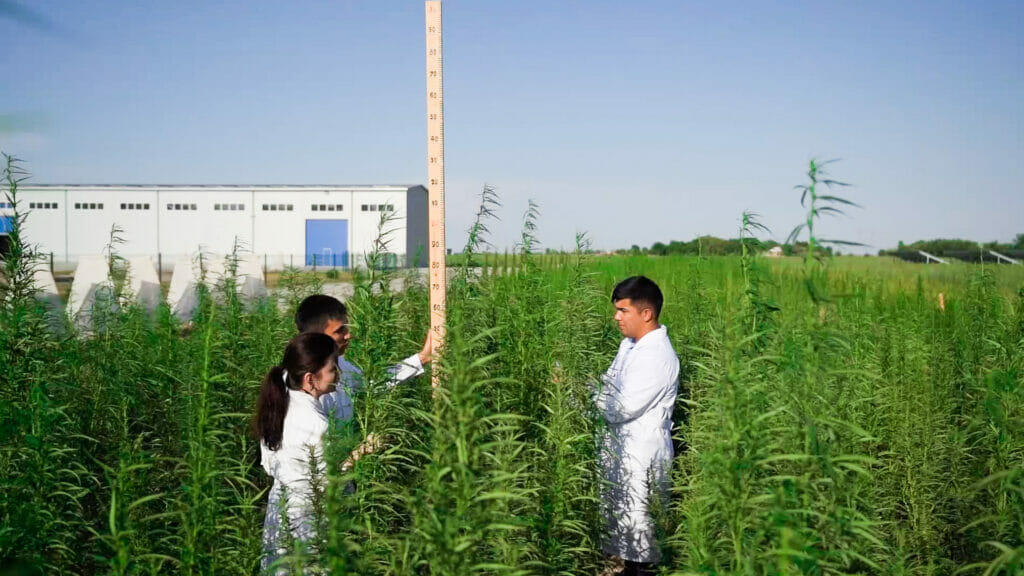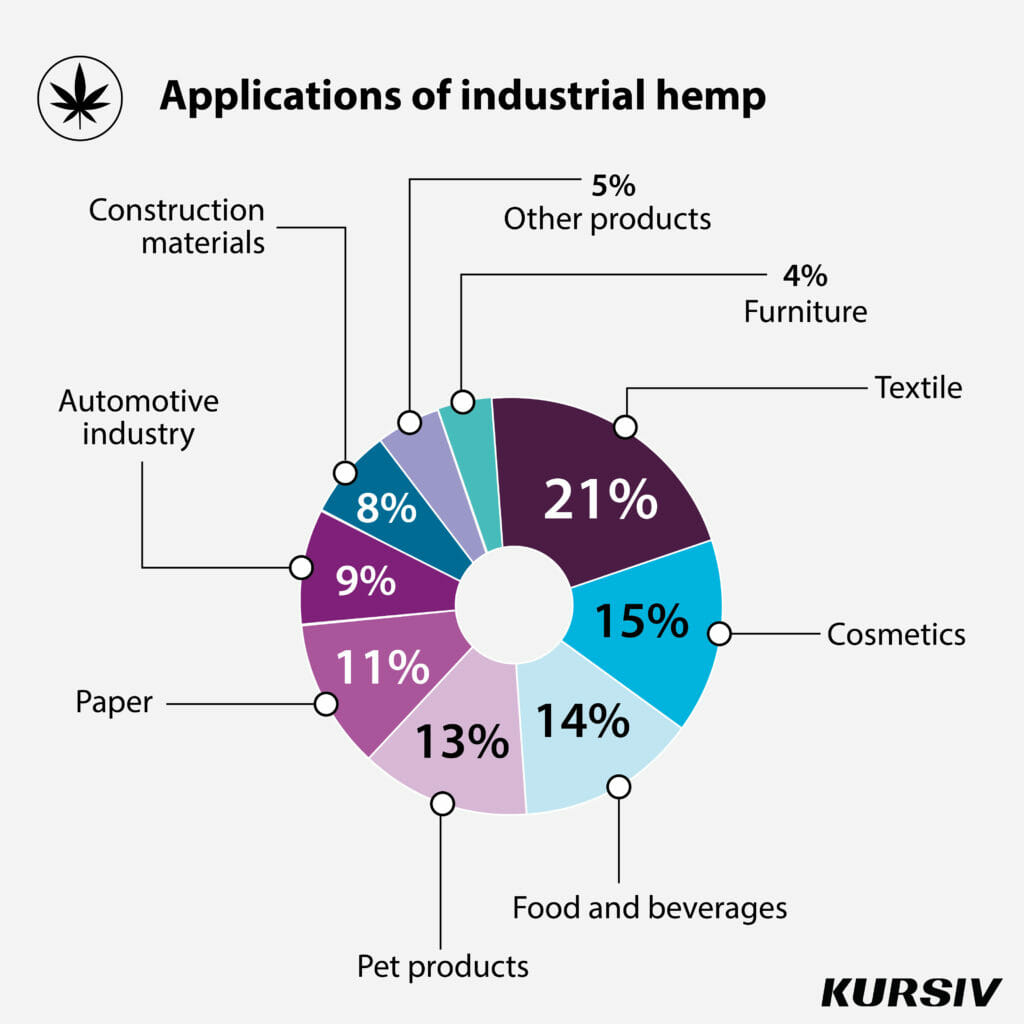Uzbekistan bets on hemp production

Uzbekistan produces hemp oil in the Sirdaryo region at a large agricultural complex constructed with the help of investors from the United Arab Emirates. Now, more new investors from the U.S., Turkey and India want to launch their hemp production here and wait for their licenses from Uzbekistan’s government.
Save the planet
The cultivation of industrial hemp is an old tradition in Central Asian countries. In Soviet times, the region produced loads of hemp for the construction and textile industries. However, in the 1980s Soviet authorities decided that hemp was dangerous and banned its production.
Everything changed 30 years later. Industrial hemp is now viewed as an important agricultural crop that can even save our planet.
«When we talk about hemp production, for many it sounds like a joke, although cannabis is a useful plant and its cultivation might be very profitable. Currently, people make paper from wood, but this can’t last long and we all know why. On the other hand, hemp doesn’t require many resources to grow it, and it’s full of cellulose,» Gleb Obydenko, deputy head of RS Success Agrо told the Kursiv edition.

First bush
RS Success Agrо is a leader in the hemp industry in Uzbekistan. The biotechnology agrarian complex started industrial hemp production in 2019. Industrial Innovation Group (IIG) from the UAE was the one who provided financial support for the project.
Even though the company primarily focuses on the technology sector, it decided to invest €182 million in hemp production in Uzbekistan.
The country’s government was so excited with the project that it has given RS Success Agro a 5,000-hectare land parcel in the Khovast settlement near the border with Tajikistan. Moreover, the company will be able to rent more land (up to 25,000 hectares) in the coming years (by 2025).
This parcel was once agricultural land, but farmers abandoned it after the land degraded. Now, along with hemp ES Success Agro seeds mustard which it never harvests in order to make this land fertile again in a natural way, according to the company’s engineer Alexander Pryanishnikov.
The irrigation system is also unusual and powered by solar panels. «We’ve put the irrigation pipelines 20 centimeters below the surface to bring water directly to crop roots. This method requires 4-6 times less water than usual,» said Pryanishnikov.
Both Pryanishnikov and Obydenko, along with some of their other colleagues, came to Uzbekistan from Ukraine, where they also produced industrial hemp. «In Ukraine, we had no problem with hemp production thanks to the highly fertile soil. Here in Uzbekistan, we have extremely hot summers and rapid changes in temperature that often cause droughts. We need to use modern irrigation technologies and loads of fertilizers,» explained Obydenko.
The company relies on locally produced fertilizers because they are quite good in quality and less expensive than foreign products. However, the company prefers to buy hemp seeds from France because this country is widely known as a key global producer and main breeder of cannabis.
It’s all about THC
The legal threshold for industrial hemp in Uzbekistan is 0.2% of THC, a key psychedelic substance that puts the plant under constant scrutiny by authorities. Obydenko says that cannabis produced by their agrarian complex has just 0.09% THC.
However, any business linked to cannabis has to obey strict rules. For example, each time the company transports its products by public roads its trucks must be escorted by the police. The level of THC in raw materials and ready-to-use products is usually examined twice: by the company’s internal laboratory and by the public laboratory of the Center of Forensic Examination.
The physical protection of the agrarian complex also has to meet strict requirements. Motion detectors and a video surveillance system must guarantee that no «rastamen from Khavast» can penetrate the field and get a chance to steal the hemp. However, the key source of anxiety here is birds, not humans. These creatures love hemp seeds and RS Success Agro uses special sound devices to keep them away from the fields.
Two main edicts by the government regulate hemp production in Uzbekistan. Almost all in the industry say that some of these rules are outdated. «We’d like these edicts to be updated because there are too many rules for transportation of hemp products and they do not reflect the current reality,» Obydenko highlighted.
Any cannabis production requires a license from the government. A license in Uzbekistan for industrial hemp production costs $80,000.
No land, no paper
Uzbekistan’s climate is good enough to yield two or even three harvests a year. This year the agrarian cluster reported its first really big harvest of hemp seeds – 500 kilograms per hectare. The company uses special headers with double harvesting devices. The upper one picks the seeds and the lower harvesting device peels hemp culms. RS Success Agro processes almost everything and produces cattle fodder, bait for fishing and hemp oil. Now the company is thinking about the production of construction bricks, floor coatings and even cosmetics.
The vast part of hemp oil produced by RS Success Agro is exported to Europe. The company is able to produce up to four tons of products per hour. Initially, the company thought to produce cellulose to make paper including special paper for banknotes. However, this type of product requires a much greater amount of hemp. «Historically cellulose fiber manufacturers have been aimed at the production of one specific type of raw material and they were designed to operate with no breaks because they are used to relying on plenty of wood,» said Obydenko.
The agrarian complex is going to solve this problem with additional land the government promised to provide the company by 2025. So far, the complex has only 3,800 hectares. The newly appointed head of the Sirdaryo region Akmal Makhmudaliyev, who took part in the official ceremony of the hemp oil production line opening, also promised to lend a hand in solving this issue.
Green future
In terms of global production of industrial hemp, the industry shows steady growth. According to the RBK survey, in 2015 the combined area planted with hemp was about 140–150 thousand hectares. In 2019 this rate reached 280,000-300,000 hectares.
As of 2019, China was the largest producer of hemp fiber and other hemp products (55%). Europe was ranked second (15%), North America third (5%) and the rest of the world accounts for the remaining 5% of the cannabis market.
One of the benefits of the hemp industry is that the plant requires much less water than many other crops. According to WWF, to produce one kilogram of fabric made from hemp, 2,123 liters of water are needed, while the same quantity of cotton fabric will require about 9,788-9,958 liters. Uzbekistan, which is widely known as a large cotton and grain producer, is going to diversify its agricultural background at the expense of industrial hemp. This direction might be very profitable and many foreign investors, including businesses from America, India and South Korea, are showing their interest in hemp production in Uzbekistan, according to Zafar Artykov, head of the agrarian technology department under the country’s Ministry of Agriculture. For example, it is expected that unidentified investors from the U.S. will get their license very soon.

